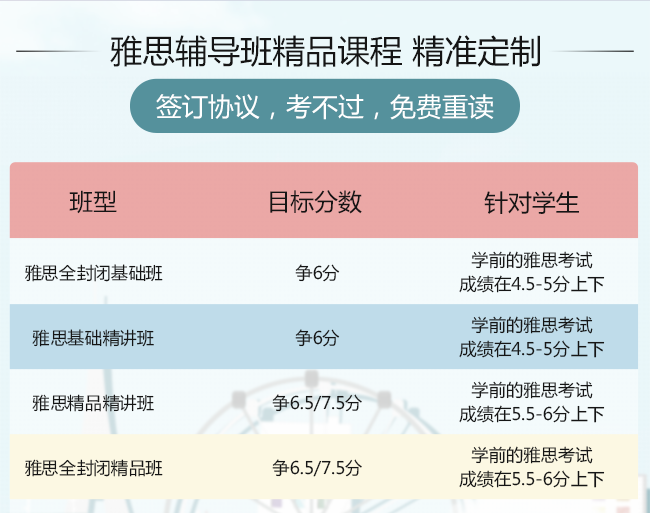雅思阅读精选:象牙塔守护的到底是什么?
文章推荐:今天雅思补习班小编的文章聊了聊教育。象牙塔中的高等教育究竟意义何在?比起职业教育来说除了一些冠冕堂皇的教育目标之外究竟还有其他用处吗?大家可以阅读之后自己判断。
Education versus work
What ivory towers actually defend?
(象牙塔守护的到底是什么?)
Eschewing college for work promotes conscientiousness but narrows minds.
(放弃读大学而直接去工作虽会让人更加认真尽责,但却会使人视野变窄。)
摘自The Economist November 24th 2018
Going to university is supposed to be a mind-broadening experience. That assertion is presumably made in contradistinction to training for work straight after school, which might not be so stimulating. But is it actually true? Jessika Golle of the University of Tübingen, in Germany, thought she would try to find out. Her result, however, is not quite what might be expected. As she reports in Psychological Science this week, she found that those who have been to university do indeed seem to leave with broader and more inquiring minds than those who have spent their immediate post-school years in vocational training for work. However, it was not the case that university broadened minds. Rather, work seemed to narrow them.
(读大学本来应该是一次开拓视野的经历。这大概是在与职业培训作对比之后人们做出的论断,这听起来可能就没那么令人振奋了。但是真的是这样吗?德国杜宾根大学的Jessika Golle想要弄清楚这一点。但是她的结论与我们预期的不同。在这周《心理学科学》杂志的报告中,她发现那些读过大学的人确实比那些职业培训后直接工作的人视野以及求知欲更广一些。然而,并非是大学拓宽视野,而似乎是直接工作是视野变窄。)
Dr. Golle came to this conclusion after she and a team of colleagues studied the early careers of 2,095 German youngsters. During the period under investigation (the system was modified slightly this year), Germany had three tracks in its schools: a low one for pupils who would most probably leave school early and enter vocational training; a high one for those almost certain to enter university; and an intermediate one, from which there was a choice between the academic and vocational routes.
(Golle教授是与其同事研究了2095个德国年轻人早期职业生涯之后得出的结论。在研究期间,德国教育体制中有三个方向:低一级教育是那些最有可能较早离开学校进入职业学校的学生;教育是针对那些确定读大学的人群;还有中级教育是为那些可在学术教育或职业教育中二选一的学生。)
The team used two standardised tests to assess their volunteers. One was of personality traits (openness, neuroticism, conscientiousness, agreeableness and extroversion). The other was of attitudes (realistic, investigative, artistic, social, enterprising and conventional). They administered both tests twice—once towards the end of each volunteer’s time at school, and then again six years later. Of the original group, 382 were on the intermediate track, and it was on these that the researchers focused. University beckoned for 212 of them. The remaining 170 opted for vocational training and a job.
(研究小组用两套标准化测试来评估这些志愿者们。一种测试是性格测试(包括开放性,神经质,勤奋性,宜人性和外向性)。另外一项测试是态度测试(现实型,探索型,艺术型,社会型,进取型,传统型)。他们做了两次测试,一次是在志愿者学校生活结束时,另一次在是六年之后。在最初的一组当中,有382个志愿者处于中级阶段,而这些志愿者是研究人员的重点。(其中)有212名被大学录取。其余170名志愿者选择了职业教育去就业。)
When it came to the second round of tests, Dr. Golle found that the personalities of those who had gone to university had changed not a statistically detectable jot. Those who had undergone vocational training and then got jobs were not that much changed in personality, either—except in one crucial respect. They had become more conscientious.
(到第二轮测试时,Golle博士发现那些读大学的志愿者的性格变化并没那么大。那些经历过职业培训而去工作的人出一项之外,个性上面变化也没有很大。他们变得更加认真尽责了。)
That sounds like a good thing, certainly compared with the common public image of undergraduates as a bunch of pampered layabouts. But changes in attitude that the researchers recorded were more worrying. In the university group, again, none were detectable. But those who had chosen the vocational route showed marked drops in interest in tasks that are investigative and enterprising in nature. And that might restrict their choice of careers.
(当然,相对于大家对毕业生常有的印象都是一帮娇惯的游手好闲的人来说,这听起来像是个好事情。然而,在态度测试上的变化令人更为担忧。同样在大学组,变化并不大。但是那些选择职业培训这条路的志愿者们,在对于探索型和进取型任务上的兴趣显著下降。而这有可能会限制他们职业的选择。)
Some investigative and enterprising jobs, such as scientific research, are, indeed off limits to the degreeless. But many, particularly in Germany, with its tradition of vocational training, are not. The researchers mention, for example, computer programmers, finance-sector workers, estate agents and entrepreneurs as careers requiring these attributes. If Dr. Golle is correct, and changes in attitude brought about by the very training Germany prides itself on are narrowing people’s choices, that is indeed a matter of concern.
(一些诸如科研等研究型及进取型的工作,没有学位的人确实是无法进入的。但是对于很多工作,尤其是在德国,由于其职业培训教育的传统,情况并非如此。比如,研究人员提到电脑程序员,金融领域的从业者,房地产中介还有企业家等职业都需要(员工)有这种特性(即科研精神以及进取心)。如果Golle博士没错,而恰恰是由德国赖以自豪的职业培训所带来的态度上的变化而使人们的选择受限,这倒确实是值得担心的问题。)
上海新航道专注雅思教育14年,每120分钟就有一位高分学员来自新航道,加入新航道,实现高分梦!












